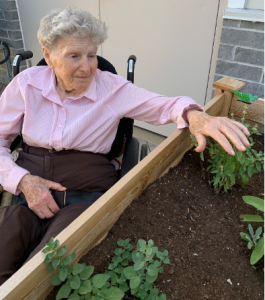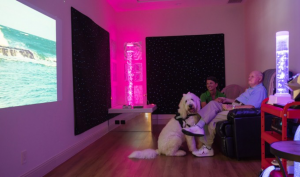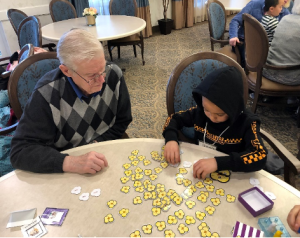
From the first suspicion that something is wrong, through the progression of cognitive, behavioral, and social changes that occur following a diagnosis, dementia affects an individuals’ quality of life in profound ways.
The research evidence is clear: essential features of quality of life for individuals living with Alzheimer’s disease and other forms of dementia include mood, engagement in pleasant activities, ease of physical functioning, and the ability to perform everyday tasks.
Whether you have dementia or are caring for a loved one with dementia, it can be a difficult and stressful time. To help improve each of these areas, we have put together a list of 5 strategies that you can use today.
Encourage social interaction
People with dementia often face social isolation as they experience a loss of relationships and a reduced social role in the community. Therefore, daily one-on-one interactions – in which people are given the opportunity to speak about their passions, personal preferences, and families – are important.
Include younger people as much as possible! There seems to be something special about intergenerational interactions. Multiple studies show benefits ranging from increased activity engagement to decreased depression and anxiety. Seniors even perform better on memory tests after participating in intergenerational programs. It also helps younger generations understand aging and face their own more positively.
Enrich life through music and art
Music provides a powerful way to connect, even after verbal communication becomes difficult. Did you know that people with Alzheimer’s or other cognitive impairment, retain musical memories long after others fade?
At College Park Residence, a sensory room was designed with this in mind. The 1950s style diner, complete with a jukebox and vinyl records on the wall, is the perfect place to walk down memory lane or just connect with friends and loved ones. Come on in, listen to your favourite music, and be transported back to your youth for a moment or two.
Art projects offer rewarding opportunities for self-expression and can create a sense of accomplishment and purpose. That’s because creating art engages a different part of the brain than the one we use for language. All Seniors Care activities often include artwork: these structured programs help to give people with dementia good moments, good hours, and good days.
Our residents are so proud of their artwork that we’ve launched a virtual Art Gallery to showcase their work! The gallery can be viewed here.
Be physically active
Regular physical exercise can help make activities of daily living easier. The longer someone can retain skills like bathing, dressing, and eating, the more independent they feel.
This is beneficial to both people with dementia and their caregivers.
their caregivers.
Engaging in physical activities can also improve self-esteem and mood, which in turn encourages more social engagement.
The standard recommendation is 150 minutes of moderately strenuous physical activity per week. This equates to 30 minutes of activity per day, for at least five days a week – which can be a long time for those with cognitive impairment. One solution is to break it into short sessions throughout the day, with each session lasting a minimum of 10 minutes. For example, it could be a 15-minute walk, and then housework or gardening tasks in the afternoon.
Types of exercise suitable for people with dementia include:
- Gardening
- Lawn bowling or indoor carpet bowl
- Dance
- Seated exercises
- Tai chi
- Walking
As a bonus, exercise is also one of the top 5 ways to sharpen memory and improve cognitive functioning.
Promote good nutrition
Regular, nutritious meals may become a challenge for people with dementia. As a person’s cognitive function declines, he or she may be overwhelmed with too many food choices, forget to eat or have difficulty with utensils.
Meals should be relaxed, unhurried and free from distraction in well-let dining rooms that feel like a home, with tasty, nourishing food that stimulates the person’s senses and appetite.
Find creative ways to communicate
Meaningful communication and connection with other people can greatly enhance quality of life. Communication is possible at all stages of dementia. It is important to speak clearly, make eye contact, and give them time to respond.
If a person’s speech becomes hard to understand, use what you know about them, coupled with intuition, to help interpret what they may be trying to say. Avoid contradicting the person or trying to persuade them that what they believe is untrue or inaccurate.
Also, make sure to give the person opportunities to make choices – this supports their individuality and independence.
Watch our blog posts in November for more communication tips!
Care Options for Dementia:
The type of care that people with dementia receive, as well as their living environment, greatly influences their sense of joy. The right type of care provides a better quality of life for the individual and reduces caregiver stress.
Here at All Seniors Care, we offer memory care services and amenities like sensory rooms to support our residents living with dementia, along with other conditions that impair memory and cognition. If you aren’t a resident, but are looking for a comfortable home for yourself or a loved one, take a look at our senior communities like the Summit Heights community or the Lakeridge Heights residence in Ontario.
Whether looking for an apartment built for two or a complete care option, The Courtyards on Eagleson retirement residence in Kanata is a wonderful choice. It is a purpose-built memory care residence specializing in individualized care where seniors can age-in-place through all stages of dementia. That’s because Eagleson uses state-of-the-art technology to ensure safety without sacrificing independence and quality of care. Trained, dedicated staff are on hand around the clock to help individuals and couples lead meaningful and fulfilling lives.
Schedule a visit to find out how our dementia-friendly design aims to prevent persons with dementia from becoming confused or agitated, help them be engaged in pleasant activities, and live comfortably at all stages of their illness.

